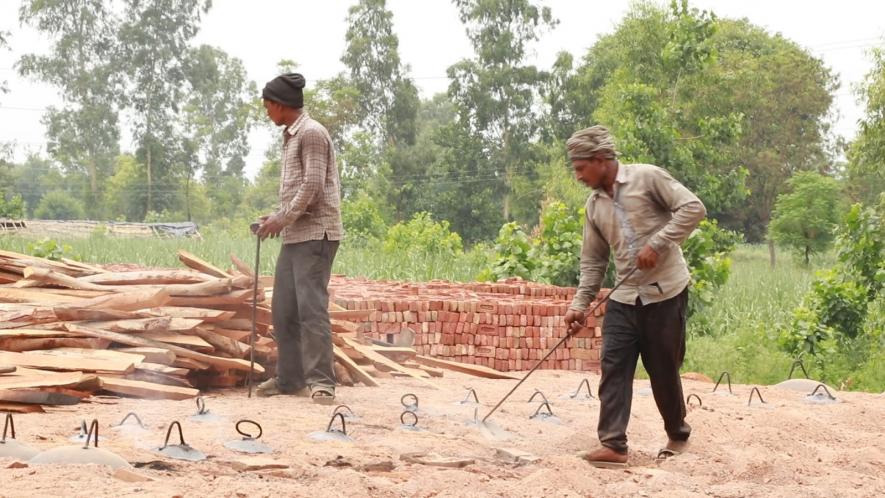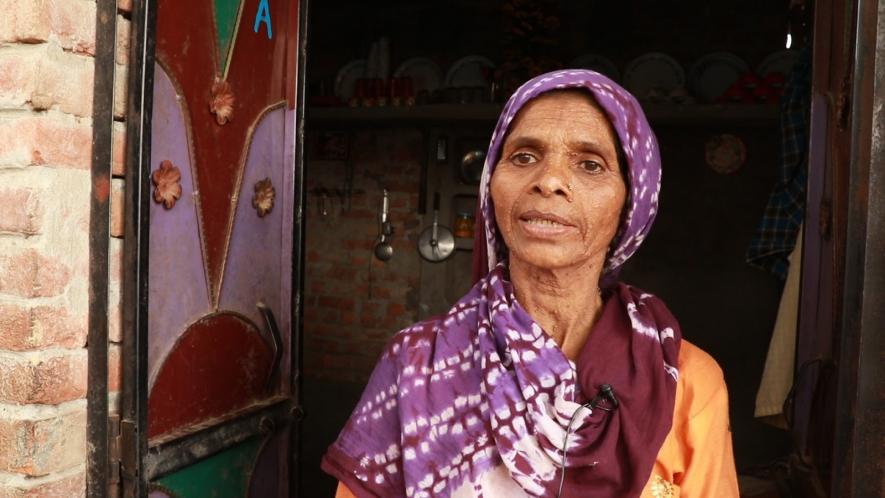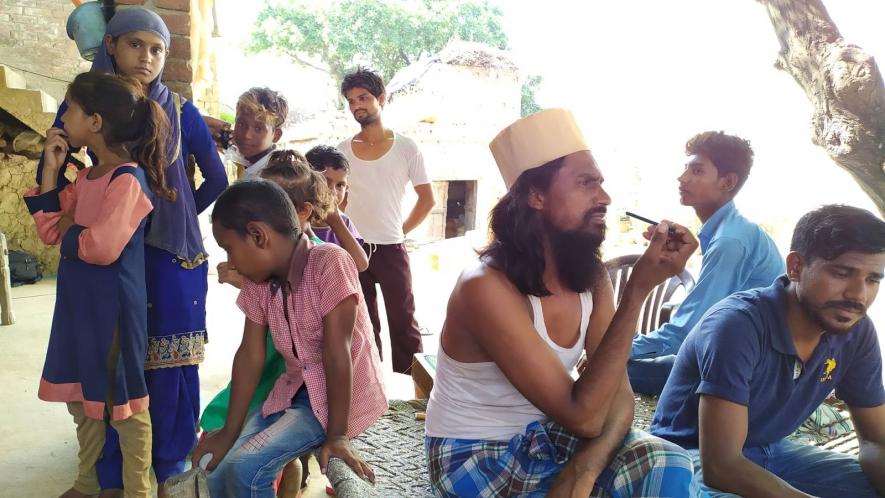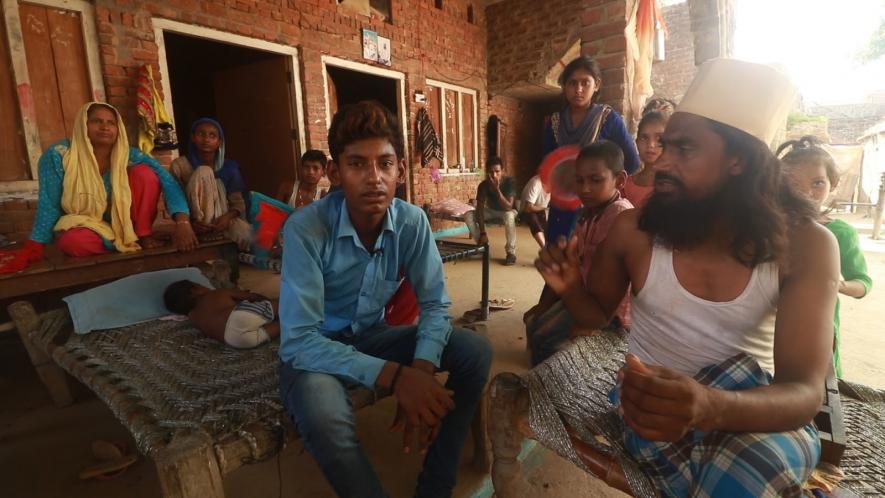Ground Report: Brick Kiln Workers in UP Simmer in the Heat Without Food, Water and Regular Wages

“I have been working on the brick kiln for the last 16 years and I still have to send my children to work in the kilns because I don't have enough money to even afford two square meals” said Islamuddin, as he wiped away sweat after toiling in a kiln for over 12 hours.
In Uttar Pradesh’s Bijnor, there are over 450 brick kilns with thousands of workers like Islamuddin toiling every day for 12-14 hours to make ends meet, sometimes even in excruciating pain and ill health.
Across India, an estimated 12 million workers are employed in brick kilns. Most of these workers are sourced from remote rural pockets with concentration of poverty through a vast network of contractors. While most of these pockets exist in Northern and Eastern part of the country, even some developed states of the Western and Southern have such pockets.
Sitting on the staircase of his one-room house which gives shelter to eight people, Nizar shows us his wounds from the time a sweltering hot brick straight out of the kiln, fell on his hand. He recalls, “I have to take this risk everyday, because I have to pay off the debt that my father had taken.” Nizar, who has been working at the kiln for the past three years, added, “Injuries on the job are very common, I have seen people fall into the kiln and turn into dust.”
Also Read: ‘Time to Free Brick Kiln Workers from Modern Slavery’
These workers take huge risks every single day for an abysmally low wage of Rs. 300 per day.
The root cause of this practice of ‘modern slavery’ is primarily the recruitment process.
Speaking to Newsclick, Shamshad Hussain of the Communist Party of India-Marxist Liberation (Democratic) in Bijnor, said, “Contractors sell off the labour of the poverty stricken workers to the owners of brick kilns. By luring them to work for the whole season on the promise of advance payments, these workers are often trafficked into different states, and are further controlled by violence and abuse, leaving them with no alternative of survival but to work for these kilns.”
While working in horrifying conditions, without access to food and water, these workers often also become targets of violence by middlemen and kiln owners. Speaking to Newsclick, a worker, Illumi, said: “I have come back from the kiln after four months. My entire family works in the kiln because we do not have an alternative. My children who I should have been sending to school, are being forced to labour.”
Elaborating on the poor working conditions, he said: “I sometimes spend 12 hours in the kiln without even going to the bathroom. For that, I have to go to a far away forest, risking my safety. Sometimes we are so engrossed in work and under pressure that we even forget to eat, because we have to meet the target of producing 2,000 bricks a day.”

The story of brick kiln workers, is often intertwined with transgenerational poverty. As one walks through narrow lanes of Najibabad, one can find families returning home after finishing work for this year’s production season.

Sitting on a charpai under the shade of a peepal tree in the scorching heat, Jamal and his family find some moments of leisure. He tells Newsclick, “ Doosre ke liye eent dhote hain but itni mazdoori nahi mil paati ki khud ka ghar bana sakein (we make bricks for people to have houses of their own but the wages for us are so low that we can’t afford a house of our own.” Jamal’s 18-year-old son, Aamir, had to drop out of school because he could not afford his education.

Not just Aamir, even children as young as five toil for over 12-18 hours per day, without any facilities, say some workers in the area. As one travels in the region, it is evident that there are no facilities for workers, who have to make the jhuggis themselves and have to pay for electricity for over four months. They use 2 watt bulbs and manage their lives in the dimly lit ratholes.
There are also clear indications that the Interstate Migrant Workmen Act remains only on paper, as the activities of and abuse by middlemen are going unchecked. Nearly all the workers deployed in these brick kilns fall under the category of ‘bonded’ labour, and a majority of them belong to deprived communities like Scheduled Castes, Scheduled Tribes, and the most backward communities.
Physical violence is common, sometimes leading to death. A 14-year-old girl’s body was found in a charred state last week in Muzaffarnagar near a brick kiln where she worked. Reports suggest that she was raped. Earlier in June, a 22-year-old brick kiln worker in Maharashtra was hacked to death by his contractor for taking an advance amount of Rs. 30,000. In another instance in May this year, 50-year-old Motka Manjhi Mal from Jharkhand lost his life after starving. He worked in a brick kiln.
Also Read: Switching from Red Clay to Fire Ash Bricks: Job Loss in Store for Workers?
Such instances of death and misery expose the underbelly of the industry, which is devoid of social security, regular wages and recognition of the rights of the workers. Instead of focusing on these issues, the Narendra Modi government is proposing to overhaul the industry. It plans to shift from the production of the fired clay brick to fly ash bricks. The notification makes it mandatory for all red clay brick kilns located within 300 kilometres of a thermal power plant to convert to fly ash brick kilns. The move is allegedly aimed at helping out corporates. But will this move help the lot of thousands of workers slaving in the kilns? As things go, the prospects look bleak.
Get the latest reports & analysis with people's perspective on Protests, movements & deep analytical videos, discussions of the current affairs in your Telegram app. Subscribe to NewsClick's Telegram channel & get Real-Time updates on stories, as they get published on our website.
























